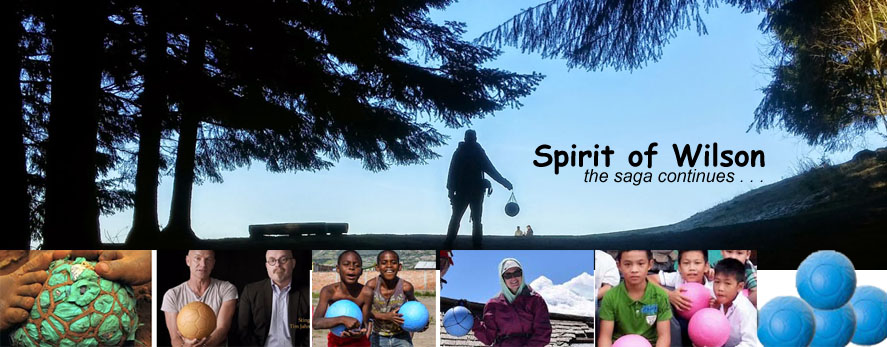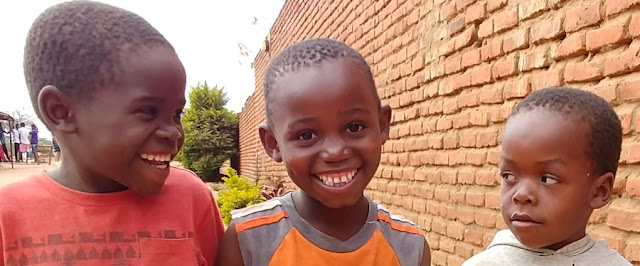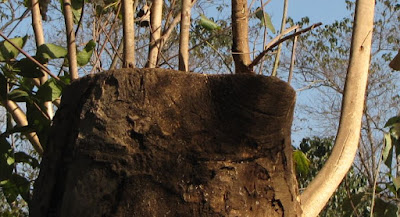 |
Nicole posed for me to conceal the obvious: I really only wanted a photo of the Tsoka flea market. |
I met her in the airline terminal in Addis Ababa, between legs of a flight connecting Toronto and Malawi's capital city, Lilongwe. You can meet a lot of interesting people at the Addis Ababa terminal. Most of the faces are black, so Westerners stand out, and it's a safe assumption that they speak English.
There's always a reason to speak up, if for only to make sure you are in the right line in unfamilair surroundings. One of the people I engaged conversation with was a doctor who was on her way to provide medical services in a remote Arican destination -- I don't remember just where. Next to her was her young shy daughter, an ingenue perhaps already far more worldly than her peers. One man I spoke with was an archeologist, heading to a dig. On the flight home, catching a nap on a chaise the Ethiopians had set out for weary travelers in Addis Abbaba's airport, I found myself next to a young Irish woman who conducted tours for students familiarizing themselves with conditions in Northern Malawi. The north is heavily forested, but the south of Malawi is nearly denuded of forests, she said; if they don't get a handle on their environment and their birth rate, this country that hosts two refugee camps for several African Nations could be in its own civil war in 10 years, she observed.
Face it, if they are between flights in Central Africa, the people you meet on the road have a life different from the ordinary and a story to share.
Nicole was no different. The fact that she was a young Asian female traveling with a male companion, set her apart. But it wasn't until we were on the plane and she was sitting in front of me that she began to share pieces of her story. I think I had been telling her about the One World Futbol, because that's what I tend to talk about when people ask me what I'm up to. I explained that these tough balls sustains hundreds of punctures without ill effect, and that's why they are ideal for disadvantaged communities such as refugee camps. Well, said Nicole, she was volunteering for There Is Hope, an organization serving Dzaleka, the major refugee camp in Southern Malawi. And then she mentioned Innocent Magambi, author of Refugee for Life, who had organized There Is Hope, suggesting that I should get in contact with him.
This was rather overwhelming, I had barely started the final flight to Lilongwe, and we were already making plans to connect when we landed, and what were the chances of that, and what was this organization, anyway, and who was this fellow, Innocent Magambi?
Sometimes, it's a small world. My hostess in Malawi knew a driver, Duncan Zimba, who could drive me around for the first few days when I was in Lilongwe getting adjusted to the time change. And when I mentioned There is Hope to Duncan, and Innocent Magambi, he needed no explanation. Duncan knew Innocent. They were virtually friends. Naturally. He's a taxi driver. They know everyone.
What that means was that there was not going to be any difficulty finding a home for 40 One World futols and 85 hats and assorted clothing I raised at the African Hat Dance -- my pre-birthday party at First Class Ballroom in Everett, WA, a few days before I flew out. But don't let me get sidetracked. This story is about Nicole -- whom I ran into immediately after arriving at There Is Hope's office in Lilongwe, and I'll be telling you all about that in a few days. Later, during my stay in Lilongwe, Nicole and I connected a couple times, including going on a shopping spree, and it was on those later connections that I heard the rest of her personal story.
Nicole speaks English fluently, but her home is in China. Sort of. In her early 20s, she really is a citizen of the world. She is a graduate of Occidental College, which was attended by a recent American president. ("After graduating from high school in 1979, Barack Obama moved to Los Angeles to attend Occidental College. In February 1981, Obama made his first public speech, calling for Occidental to participate in the disinvestment from South Africa in response to that nation's policy of apartheid." --Wikipedia)
She also attended college in Britain, and she was an intern at the United Nations, where she witnessed President Trump's famous "Rocket Man" comments about North Korean Leader Kim Jong-un. (Diplomats tend to be reserved when a head of state is speaking, but Trump's remarks noticeably influenced facial expressions, she said.)
Graduation Day at Occidental was not totally a joyful experience for Nicole. She felt the weight of responsibility of being so privileged when literally millions of young Chinese women have limited opportunities to experience the same achievements. And to have come so far when only chance prevented her from being aborted gives her a sense that she has a debt to pay for the honors and privileges she has experienced.
Nicole's eyes moistened as she shared her story over lunch: Her parents were well educated, and her father was an accountant in a Chinese firm. He and her mother lived in a village at a time of China's one-child policy, when neighbors would report when a woman's pregnancy became obvious. If her family didn't have an abortion after the first child, her father could lose his job, Nicole said. And so two siblings ahead of her were aborted.
And then chance took center stage: The factory closed. The family had an excuse for being displaced, and her mother, who was not yet showing with Nicole, went to a city where she had a degree of anonymity. After Nicole's birth, sometimes her mother would hide with her in public toilets, where the odor discouraged individuals from investigating them.
Nicole, who was "undocumented" into her teen years, learned the story by bits and pieces as she grew up, only learning later in life that two siblings had to be sacrificed. And so, along with the gift of life she carries with her a sense that she has an obligation to make a difference.
 |
Nicole shows off Kibebe products: pen holders, cards, bibs, shopping bags, colorful storage boxes. |
In Lilongwe, her plan is to make a difference using a $10,000 Davis Projects grant with There is Hope to help refugees at Dzaleka produce goods for sale via an Online Shop for Refugee Empowerment. You can also see images of their products on Facebook at Kibebe Malawi.
 |
Showing fabrics |
Because the camp is supported by the United Nations, the refugees are prohibited from holding jobs. But they can still manufacture goods for sale. Nicole is marketing the goods via Shopify.com. I purchased a couple of the items for sale -- a purse that unzips and unfolds into a shopping bag and a picnic blanket.
Nicole's story resonated with me. It reminded me of the time 50 years ago, when President Lyndon Johnson, following the assassination of President Kennedy, persuaded Congress to create a domestic Peace Corps called Volunteers in Service to America (V.I.S.T.A.).
In 1965, one such VISTA volunteer went to Appalachia, realized that girls were living in poverty because they didn't graduate from school due to poor clothing, and wrote a grant for sewing machines so she could teach their mothers how to make clothes cheaper than they could purchase them.
A few years ago, I discovered and read that grant proposal which that young woman wrote to obtain the machines to teach those skills. I had located that remarkably well-written proposal among her effects when it came time for her memorial service following our 30-year marriage. Nicole is close to the age that Betty was when she was serving in Appalachia. So, as you might imagine, I dearly hope that Nicole -- Hongjin Lin -- stays in touch and keeps me informed about the progress of her career.
Like Yogi Berra was supposed to have said: "It's déjà vu all over again."
Love,
Robert
And Shu


















































